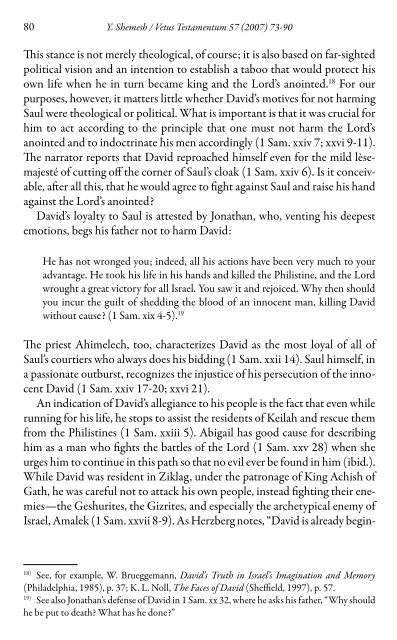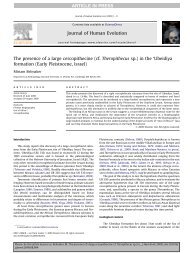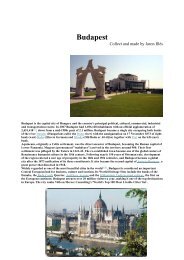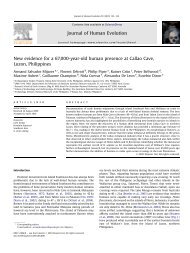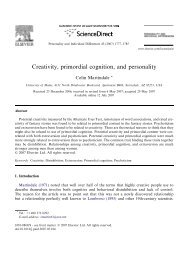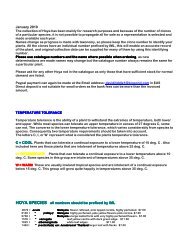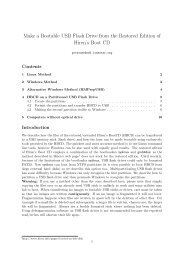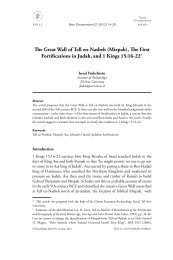David in the Service of King Achish of Gath: Renegade to His ...
David in the Service of King Achish of Gath: Renegade to His ...
David in the Service of King Achish of Gath: Renegade to His ...
You also want an ePaper? Increase the reach of your titles
YUMPU automatically turns print PDFs into web optimized ePapers that Google loves.
80 Y. Shemesh / Vetus Testamentum 57 (2007) 73-90<br />
Th is stance is not merely <strong>the</strong>ological, <strong>of</strong> course; it is also based on far-sighted<br />
political vision and an <strong>in</strong>tention <strong>to</strong> establish a taboo that would protect his<br />
own life when he <strong>in</strong> turn became k<strong>in</strong>g and <strong>the</strong> Lord’s ano<strong>in</strong>ted. 18 For our<br />
purposes, however, it matters little whe<strong>the</strong>r <strong>David</strong>’s motives for not harm<strong>in</strong>g<br />
Saul were <strong>the</strong>ological or political. What is important is that it was crucial for<br />
him <strong>to</strong> act accord<strong>in</strong>g <strong>to</strong> <strong>the</strong> pr<strong>in</strong>ciple that one must not harm <strong>the</strong> Lord’s<br />
ano<strong>in</strong>ted and <strong>to</strong> <strong>in</strong>doctr<strong>in</strong>ate his men accord<strong>in</strong>gly (1 Sam. xxiv 7; xxvi 9-11).<br />
Th e narra<strong>to</strong>r reports that <strong>David</strong> reproached himself even for <strong>the</strong> mild lèsemajesté<br />
<strong>of</strong> cutt<strong>in</strong>g <strong>of</strong>f <strong>the</strong> corner <strong>of</strong> Saul’s cloak (1 Sam. xxiv 6). Is it conceivable,<br />
aft er all this, that he would agree <strong>to</strong> fight aga<strong>in</strong>st Saul and raise his hand<br />
aga<strong>in</strong>st <strong>the</strong> Lord’s ano<strong>in</strong>ted?<br />
<strong>David</strong>’s loyalty <strong>to</strong> Saul is attested by Jonathan, who, vent<strong>in</strong>g his deepest<br />
emotions, begs his fa<strong>the</strong>r not <strong>to</strong> harm <strong>David</strong>:<br />
He has not wronged you; <strong>in</strong>deed, all his actions have been very much <strong>to</strong> your<br />
advantage. He <strong>to</strong>ok his life <strong>in</strong> his hands and killed <strong>the</strong> Philist<strong>in</strong>e, and <strong>the</strong> Lord<br />
wrought a great vic<strong>to</strong>ry for all Israel. You saw it and rejoiced. Why <strong>the</strong>n should<br />
you <strong>in</strong>cur <strong>the</strong> guilt <strong>of</strong> shedd<strong>in</strong>g <strong>the</strong> blood <strong>of</strong> an <strong>in</strong>nocent man, kill<strong>in</strong>g <strong>David</strong><br />
without cause? (1 Sam. xix 4-5). 19<br />
Th e priest Ahimelech, <strong>to</strong>o, characterizes <strong>David</strong> as <strong>the</strong> most loyal <strong>of</strong> all <strong>of</strong><br />
Saul’s courtiers who always does his bidd<strong>in</strong>g (1 Sam. xxii 14). Saul himself, <strong>in</strong><br />
a passionate outburst, recognizes <strong>the</strong> <strong>in</strong>justice <strong>of</strong> his persecution <strong>of</strong> <strong>the</strong> <strong>in</strong>nocent<br />
<strong>David</strong> (1 Sam. xxiv 17-20; xxvi 21).<br />
An <strong>in</strong>dication <strong>of</strong> <strong>David</strong>’s allegiance <strong>to</strong> his people is <strong>the</strong> fact that even while<br />
runn<strong>in</strong>g for his life, he s<strong>to</strong>ps <strong>to</strong> assist <strong>the</strong> residents <strong>of</strong> Keilah and rescue <strong>the</strong>m<br />
from <strong>the</strong> Philist<strong>in</strong>es (1 Sam. xxiii 5). Abigail has good cause for describ<strong>in</strong>g<br />
him as a man who fights <strong>the</strong> battles <strong>of</strong> <strong>the</strong> Lord (1 Sam. xxv 28) when she<br />
urges him <strong>to</strong> cont<strong>in</strong>ue <strong>in</strong> this path so that no evil ever be found <strong>in</strong> him (ibid.).<br />
While <strong>David</strong> was resident <strong>in</strong> Ziklag, under <strong>the</strong> patronage <strong>of</strong> K<strong>in</strong>g <strong>Achish</strong> <strong>of</strong><br />
<strong>Gath</strong>, he was careful not <strong>to</strong> attack his own people, <strong>in</strong>stead fight<strong>in</strong>g <strong>the</strong>ir enemies—<strong>the</strong><br />
Geshurites, <strong>the</strong> Gizrites, and especially <strong>the</strong> archetypical enemy <strong>of</strong><br />
Israel, Amalek (1 Sam. xxvii 8-9). As Herzberg notes, “<strong>David</strong> is already beg<strong>in</strong>-<br />
18) See, for example, W. Brueggemann, <strong>David</strong>’s Truth <strong>in</strong> Israel’s Imag<strong>in</strong>ation and Memory<br />
(Philadelphia, 1985), p. 37; K. L. Noll, The Faces <strong>of</strong> <strong>David</strong> (Sheffield, 1997), p. 57.<br />
19) See also Jonathan’s defense <strong>of</strong> <strong>David</strong> <strong>in</strong> 1 Sam. xx 32, where he asks his fa<strong>the</strong>r, “Why should<br />
he be put <strong>to</strong> death? What has he done?”


